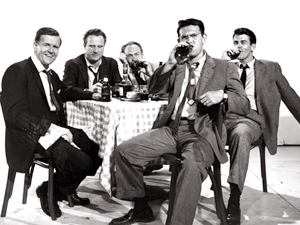Bachelor Party The (1957) – full review!
Bachelor Party The (1957) – full review!

One might be tempted to label this drama "dated" however as was typical screenwriter Paddy Chayefsky provided it with a story that is both insightful and (still) enduring today. Though the setup is rather contrived (a 30+ year old virgin male find himself about to be married to a more experienced war widow that also happens to be his distant cousin) every man questions: who he is what he’s become or what he will be if he continues down his current path and/or his spouse and the state of his marriage at some point during his life … and the truth isn’t always pretty. While some of the events in the movie are "out of date" (e.g. the men watch stag films in a bachelor’s apartment in lieu of going to a strip club) the story and its underlying themes remain as fresh as ever.
Don Murray is top billed in his second film role after earning his only Academy recognition with a Best Supporting Actor nomination (in his screen debut) for playing a rodeo hick hunk opposite Marilyn Monroe in Bus Stop (1956). Initially the focus of the plot appears to be on Murray’s character Charlie and his wife Helen (Patricia Smith); they’re a young couple past the newlywed stage and they’ve just learned that she’s pregnant with (what would be) their first child. He goes to night school attempting to earn a degree for eventual advancement while she spends nights alone in their apartment with television or her sister-in-law Julie (Nancy Marchand) to keep her company. Still Helen encourages Charlie to skip school that evening to attend the titled event and enjoy a much needed respite from his daily grind. When Charlie gets to work that morning the party’s other would be participants (all bookkeepers by profession) are introduced: two are married and somewhat henpecked and two are bachelors:
- Jack Warden is perfectly cast as Eddie the confirmed bachelor who’s (the titled groom’s best man to be and) in charge of the evening’s planned events. Except for "man of the hour" Arnold (Philip Abbott) and Eddie the others are somewhat reluctant to commit to the festivities ("I’ll go if you go"). Of course in the end we learn that Eddie’s life is empty as he pleads with his coworkers to stay as long as possible so he doesn’t have to return home alone to his empty abode.
- E.G. Marshall as Walter is (by far) the oldest participant; he’s in the twilight of his career with a mortgage and a daughter in college. Walter was recently diagnosed with asthma and advised to move to Arizona. Realizing his dire prospects and lack of "hire-ability" per his age he expresses anxiety about the situation in various ways: early in the evening he laughs excessively later he’s captivated by the stag films and finally after sweating profusely he walks off away from the rest in solitude
- Larry Blyden plays Ken (between Charlie and Walter in age); he provides a steadying voice of experience to Charlie when he notices that his friend is about to stray (e.g. have an affair) midway through the evening. Ken had once strayed during a business trip and laments the change in his wife ever since; he’s also the first to leave the party to go home though he’s unsuccessful in his attempt to convince Charlie to do the same.
- Arnold is a rather pathetic bridegroom; in one sense Abbott’s character is a plot device to give the other characters their moments of reflection.
The film is also notable for earning Carolyn Jones her only Oscar nomination (Supporting Actress); she plays the Existentialist an oversexed Greenwich Village philosopher that the men (specifically Charlie) encounter during the evening. You’ll remember the performance for the speed of her (line) delivery as much as anything (plus she looks a little like a young dark-haired Bette Davis). Otherwise you might wonder if her performance was the shortest ever to be Oscar nominated; ironically that record is held by Beatrice Straight’s stint in Chayefsky’s prescient drama Network (1976) which was decades ahead of its time in predicting today’s world: the cult of celebrity ratings-based news programming faux experts and "reality" TV.
While the film’s ending may seem "tacked on" it contains a certain truth. While Arnold learned that married life isn’t a panacea Charlie gained an appreciation for what he had with Helen. It was directed by Delbert Mann only his second film after Marty (1955) which was another Chayefsky-written drama (that initially aired on TV) about lonely people.
© 2007 Turner Classic Movies – this article originally appeared on TCM’s official blog
